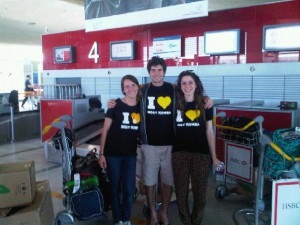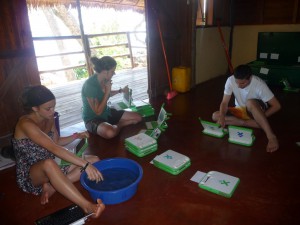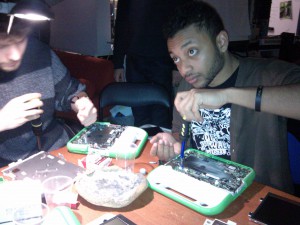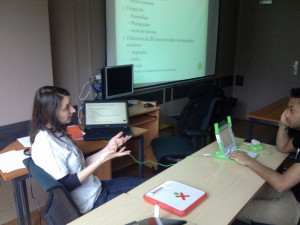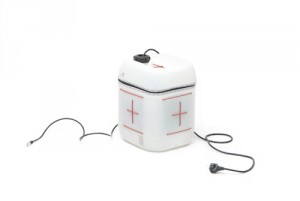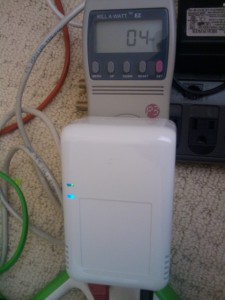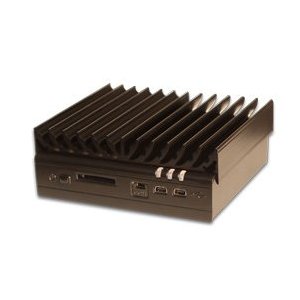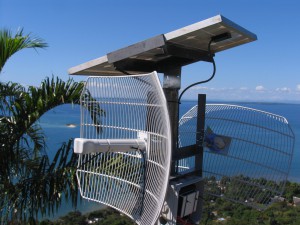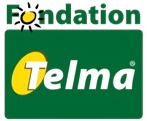Nosy Komba 2012: We’ve arrived!
We have been preparing for many weeks, but here it is: with the departure yesterday [late May] of the first team to Nosy Komba, the 2012 project has now started in earnest! With all our preparation done, we are now ready to carry out our planned work in the coming weeks.
Briefly, three teams will arrive, one after the other, to work on three different themes:
- XOs and pedagogy
- School Server
- Internet
XO and pedagogy
The first team paired with our partners from G du Coeur, consisting of Laura, John and Margaud.
As in years past, their first task was to inventory XO laptops: counting them and checking their general condition, making repairs and locating replacements. To avoid last year’s pitfalls, the inventory process was prepared in coordination with stakeholders from last year, including Charlotte and Raphaèle training the 2012 team with their invaluable field experience.
Our repair-training workshop was led by Lionel and Xavier. The team learned how to completely disassemble an XO (screen, motherboard, and keyboard) and was able to practice on machines brought back from Nosy Komba last year. They thus « revived » 3 broken XOs under the same conditions they will encounter on site.
Pedagogy is a key element of the OLPC project. This year we were thrilled to have the team prepare alongside our project in Saint-Denis. In so doing, each team member was able to experience several class sessions in Saint-Denis assisting teachers and children learning how to use the XO. This represents a truly priceless opportunity for the team to understand the real-world challenges of using of XOs in the classroom.
Sandra organized our workshop to prepare our team to work with the teachers. Videos from OLPC deployments were analyzed, and exercises conducted to understand different approaches used by experienced teachers around the world to introduce XOs.
Towards enriching content, Laura’s recent travels to OLPC deployments in Haiti and Jamaica, as well as her work at OLPC’s Boston Headquarters, have provided her with experience adaptable to Nosy Komba. This together with experiences from Saint-Denis teachers, permitted the team to prepare a new version of the software reflashing key with new activities (Photo Toon Tuxmath, Dr. Geo, …) and to prepare workshops for teachers.
School Server
Two experienced international volunteers, Adam from Haiti and Mitch from the Philippines, who will work on the server in July. Various avenues are under exploration to prepare for the replacing of the XS server set up in 2010.
Consider our friends from Jerry DIY who worked on an innovative low-cost server during a workshop in March.
Using one of Clément’s ideas, we established (with the help of Sameer Verma of San Francisco), a super-compact Sheeva Plug server which can act as a low-power content server, saving invaluable electricity.
Finally, a few days before our departure for Nosy Komba, Kevin and Xavier assembled a low-power mini-PC fit-PC2/i with SSD’s (solid-state disks) to avoid past mechanical disk failures, possible caused the island’s dusty/humid conditions. The fit-PC should work with Direct Current (DC) electrity, straight from our solar panels, hence avoiding power losses due to Alternating Current (AC) conversions. Thanks to June and Alex, who purchased parts directly for us in the US, it was possible to send the server in the team’s baggage.
Internet Infrastructure
In another project Xavier will work with Jonathan on Internet infrastructure. The objective is to reinforce & strengthen the long-range wireless WiFi Internet access we installed last year.
To support this work, we were fortunate to receive a generous grant from the Telma Foundation. This is the Foundation behind Madagascar’s primary Internet Service Provided, which generously provided us with our Internet connection. The Foundation is also considering having their technicians take over our infrastructure maintenance. A big thank you to them!
In terms of Internet usage, Sandra and Laura reviewed and discussed with our membership, preparing different discovery workshops enabling teachers and children to use this new medium. Of course, Squid filtering will be installed to prevent access to inappropriate content.
Conclusion
As in previous years we have done our best to prepare for this project. It has been a real group effort, both in France and also with our international volunteer friends. We hope to have the best possible Nosy Komba!
Congratulations and thanks to all those volunteers who donate their time and energy to the project.
Warm thanks also to our sponsors, without whom nothing would be possible: the Arfeuille Foundation, the ASML company, OLPC Europe and all others who have supported this important work.
